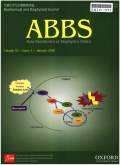- 钛学术文献服务平台 \
- 学术期刊 \
- 基础科学期刊 \
- 生物科学期刊 \
- 生物化学与生物物理学报(英文版)期刊 \
null
The imbalance of IL-18/IL-18BP in patients with systemic juvenile idiopathic arthritis
基本信息来源于合作网站,原文需代理用户跳转至来源网站获取
摘要:
Systemic JIA (SJIA) is one subtype of juvenile idiopathic arthritis (JIA) that is a leading cause of short-term and long-term disability in children [1].Although SJIA represents only 10%-20% of all cases of JIA,it accounts for more than two-thirds of the mortality associated with this condition [2].The etiology and pathogenesis of SJIA remain unknown.Further understanding of SJIA pathogenesis may facilitate new therapeutic approaches.
Interleukin-18 (IL-18) was originally identified as an interferon gamma (IFN)-γ-inducing factor,and IL-18 can induce INF-γ production by splenocytes,hepatic lymphocytes,and type 1T helper (Thl) cell clones [3].IL-18 levels have been shown to be abnormal in some inflammatory diseases and in autoimmune diseases.IL-18 expression has been reported to be up-regulated in lupus nephritis (LN),type 1 diabetes,and other autoimmune diseases [4].

推荐文章
期刊_丙丁烷TDLAS测量系统的吸收峰自动检测
带间级联激光器
调谐半导体激光吸收光谱
雾剂检漏 中红外吸收峰 洛伦兹光谱线型
不同盐度、温度及光照对漂浮浒苔生理生态的影响
浒苔
盐度
温度
光照
生理生态
期刊_联合空间信息的改进低秩稀疏矩阵分解的高光谱异常目标检测
高光谱图像
异常目标检测 低秩稀疏矩阵分解 稀疏矩阵 残差矩阵
内容分析
关键词云
关键词热度
相关文献总数
(/次)
(/年)
文献信息
| 篇名 | The imbalance of IL-18/IL-18BP in patients with systemic juvenile idiopathic arthritis | ||
| 来源期刊 | 生物化学与生物物理学报(英文版) | 学科 | |
| 关键词 | |||
| 年,卷(期) | 2013,(4) | 所属期刊栏目 | |
| 研究方向 | 页码范围 | 339-341 | |
| 页数 | 3页 | 分类号 | |
| 字数 | 语种 | 英文 | |
| DOI | 10.1093/abbs/gmt007 | ||
五维指标
引文网络
引文网络
二级参考文献 (0)
共引文献 (0)
参考文献 (5)
节点文献
引证文献 (0)
同被引文献 (0)
二级引证文献 (0)
1997(1)
- 参考文献(1)
- 二级参考文献(0)
1998(1)
- 参考文献(1)
- 二级参考文献(0)
1999(1)
- 参考文献(1)
- 二级参考文献(0)
2002(1)
- 参考文献(1)
- 二级参考文献(0)
2019(1)
- 参考文献(1)
- 二级参考文献(0)
2013(0)
- 参考文献(0)
- 二级参考文献(0)
- 引证文献(0)
- 二级引证文献(0)
引文网络交叉学科
相关学者/机构
期刊影响力
生物化学与生物物理学报(英文版)
主办单位:
中国科学院上海生命科学研究院生物化学与细胞生物学研究所
出版周期:
月刊
ISSN:
1672-9145
CN:
31-1940/Q
开本:
16开
出版地:
上海市岳阳路319号31-B
邮发代号:
4-210
创刊时间:
1961
语种:
eng
出版文献量(篇)
3098
总下载数(次)
1
期刊文献
相关文献
推荐文献
- 期刊分类
- 期刊(年)
- 期刊(期)
- 期刊推荐
力学
化学
地球物理学
地质学
基础科学综合
大学学报
天文学
天文学、地球科学
数学
气象学
海洋学
物理学
生物学
生物科学
自然地理学和测绘学
自然科学总论
自然科学理论与方法
资源科学
非线性科学与系统科学
生物化学与生物物理学报(英文版)2022
生物化学与生物物理学报(英文版)2021
生物化学与生物物理学报(英文版)2020
生物化学与生物物理学报(英文版)2019
生物化学与生物物理学报(英文版)2018
生物化学与生物物理学报(英文版)2017
生物化学与生物物理学报(英文版)2016
生物化学与生物物理学报(英文版)2015
生物化学与生物物理学报(英文版)2014
生物化学与生物物理学报(英文版)2013
生物化学与生物物理学报(英文版)2012
生物化学与生物物理学报(英文版)2011
生物化学与生物物理学报(英文版)2010
生物化学与生物物理学报(英文版)2009
生物化学与生物物理学报(英文版)2008
生物化学与生物物理学报(英文版)2007
生物化学与生物物理学报(英文版)2006
生物化学与生物物理学报(英文版)2005
生物化学与生物物理学报(英文版)2004
生物化学与生物物理学报(英文版)2003
生物化学与生物物理学报(英文版)2002
生物化学与生物物理学报(英文版)2001
生物化学与生物物理学报(英文版)2000
生物化学与生物物理学报(英文版)1999
生物化学与生物物理学报(英文版)2013年第9期
生物化学与生物物理学报(英文版)2013年第8期
生物化学与生物物理学报(英文版)2013年第7期
生物化学与生物物理学报(英文版)2013年第6期
生物化学与生物物理学报(英文版)2013年第5期
生物化学与生物物理学报(英文版)2013年第4期
生物化学与生物物理学报(英文版)2013年第2期
生物化学与生物物理学报(英文版)2013年第12期
生物化学与生物物理学报(英文版)2013年第11期
生物化学与生物物理学报(英文版)2013年第10期
生物化学与生物物理学报(英文版)2013年第1期

 免费查重
免费查重










